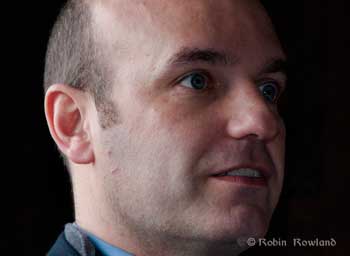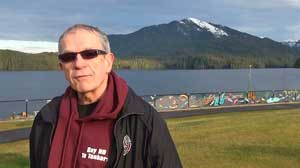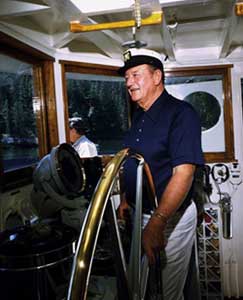Just who is interfering with the fairness of the Northern Gateway Joint Review panel hearings?
Almost every day since the hearings began in Kitamaat Village, intervenors have raised questions about the fairness of the hearings, especially after Prime Minister Stephen Harper and Natural Resources Minister Joe Oliver began attacking what they called “foreign radicals,” the government say are “hijacking” the hearings.
Perhaps the most dramatic moment in the hearings, so far, came in Smithers, on January 16, 2012 (without the national media present) when the leaders of the Wet’suwet’en First Nation brought up the question of political interference in the hearings.
Chief Alphonse Gagnon, of the Laksamshu clan, summed it up this way.
Before this Panel started, we had Prime Minister Harper make a comment about how he agreed with this proposed pipeline and also the Minister in charge agreeing with the pipeline.
The Minister in charge talked about the effects if the pipeline don’t go through, the financial effects on the government and the financial effects on industry itself, on jobs that would be created.
This is the stuff that happened just before we got into this. This is the stuff that was coming onto the news last week.
Now, that’s them talking about the fact that this — what will happen if the pipeline don’t go through. My question is the other way around; what will happen if the pipeline goes through?
The same day, Chief George Williams of the Tsayu clan, said to the Joint Review panel:
Wakoos; somebody should tell Stephen Harper of what wakoos meant.
Wakoos means respect. It is our job, Tsayu, Laksilyu, Gilseyhu, Laksamshu, to
protect our territories. Our language, our culture comes from the territories. Harper should show wakoos, respect, and come to our territory and put on a feast and let us know what his plans are.
The first day of the hearings weren’t as dramatic, but on that day, on the first morning, Haisla chief Henry Amos said:
I have nothing against the Panel but I’m concerned. I’m concerned about the decision making of this project; that Ms. [Sheila] Leggett and Mr. [Kenneth] Bateman both work for the National Energy Board, one as a Vice-Chair and the other one as a Chair of the Regulatory Policy Committee, I believe — correct me if I’m wrong — and Mr. [Hans] Matthews, First Nation from the Eastern Province of Ontario.
When I think about it — and this is my own personal opinion — we, the Haisla are already at a disadvantage. We have no representation from the Province of British Columbia.
I realize your tasks. I also know that you’re an independent body, which is good in a way, but what bothers me the most is that you’re appointed, I think from your information it was from the Minister of Environment and the National Energy Board. You’re appointed by the Federal Government and it’s the same government
that is telling the world that this project should go ahead. That is my biggest concern.
Chair Sheila Leggett then cut off any discussion of the fairness of the hearings, as she would from then on, by saying:
Chief Amos, we’re here today to listen to your oral evidence that wouldn’t be able to be put in writing, and the example we’ve been using in the Hearing Order and the information we’ve been publishing is that it would be traditional knowledge.
So I’m hoping that your comments will be along those lines because that
is what we’re here to listen to today.
Just a few hours later, Haisla chief counsellor Ellis Ross wrapped up the first day of hearings by saying: “I came into this meeting today thinking I was going to rant and rave about the comments made by Harper and Oliver and then I found myself basically trusting you guys to assess everything we said here and take it into consideration.”
Ecojustice motion
After three weeks of hearings, on Friday, January 27, the Vancouver environmental umbrella group, Ecojustice, a coalition of the Raincoast Conservation Foundation, the Living Oceans Society and Forest Ethics, filed a motion with the Joint Review Panel calling into question the fairness of the hearings.
The motion asks the panel to
determine if recent statements by the Prime Minister or by the Minister
of Natural Resources who is responsible for the National Energy Board constitute an
attempt by those Ministers to undermine or have had the effect of undermining the
Panel hearing process or the credibility of any intervenor or any person appearing
before the Panel resulting in unfairness in the hearing process, and if so, that the Panel identify the steps it will take to correct such unfairness.
It also calls on the panel to
determine if recent statements by the Prime Minister or by the Minister
of Natural Resources have contributed to an appearance that the outcome of the Panel’s proceedings has been predetermined, undermining the Parties’ and public confidence in the independence of the Panel.
It wants the panel to issue a statement confirming that is independent of and not influenced by statements of the Prime Minister, the Minister of Natural Resources or other Ministers of the Crown.
As well, Ecojustice wants the panel
to confirm that the credibility of Parties and witnesses will be tested only through information requests and cross examination and will not be influenced by statements of the Prime Minister, the Minister of Natural Resources or other Ministers of the Crown.
It calls on the panel to confirm
that the Panel will be guided only by the principles of environmental
assessment and the requirements of the National Energy Board Act and the
Canadian Environmental Assessment Act.
Ecojustice also wants the panel to hold hearings with witnesses to determine whether or not the hearings are fair.
Joint Review Panel spokeswoman Annie Roy told the media that Ecojustice motion will be considered and ruled on “at a later date.” Roy’s e-mail to the media also said:
“The joint review panel for the Enbridge Northern Gateway project is an independent body that was established jointly by the federal minister of the environment and the chairman of the National Energy Board.”
PMO response
Within hours of the Ecojustice filing, the Prime Minister’s Office issued an “InfoAlert,” saying that it was Ecojustice who was interfering with the fairness of the Joint Review Hearings
Foreign radicals threaten further delays
Today, Ecojustice attacked the independence of the Northern Gateway Joint Review Panel. ForestEthics, Living Oceans Society and Raincoast Conservation Foundation joined them in their attack on the Joint Review Panel.
Here are the facts:
The Northern Gateway is currently going through a careful and comprehensive review process to ensure the proposal is safe and environmentally sound.
Radical groups are trying to clog and hijack the process, rather than letting the panel do its job independently, expeditiously, and efficiently.
Our government has asked that the review process be conducted efficiently and without excessive delays. We believe reviews for major projects can be accomplished in a quicker and more streamlined fashion.
We do not want projects that are safe, generate thousands of new jobs and open up new export markets to die in the approval phase due to unnecessary delays.
Our Government’s top priority remains the economy and creating jobs.
Canada is on the edge of a historic choice – to diversify our energy markets away from our traditional trading partner in the United States or to continue with the status quo.
The one problem with the statement from the Prime Minister’s Office is that it appears to confirm the fears about the fairness of the hearings. That’s because the PMO release pre-judges the hearings, which are will be ongoing for a year or more by saying that the Northern Gateway is one of the “projects that are safe, [will] generate thousands of new jobs and open up new export markets.”
It is the Joint Review Panel’s decision whether or not the pipeline is safe, and will generate thousands of jobs. It is the Joint Review Panel’s task to decide whether or not the Northern Gateway pipeline is in the national interest.
In its news release, Ecojustice says
The proposed pipeline project is one of the most significant, and controversial, public interest issues in recent memory. The decision around whether or not to build this pipeline is going to affect our country — both the people who live here and the environment — for a long time to come…
This review process is rooted in facts and science — not politics — and it is the most comprehensive and transparent way to fairly weigh the project’s environmental consequences against its economic merits. Given the impact this project would have on our country, it’s absolutely critical that this process is objective, representative of all interests and conducted with integrity and fairness.
This isn’t just an ethical issue – it’s about the principles of fairness and due process.
We filed this motion because Ecojustice believes those participating in the process — and all Canadians — need to hear from the JRP that its process has not been compromised by recent political controversy.
This month, the Prime Minister and Natural Resource Minister Joe Oliver singled out “environmental and other radical groups” for threatening to “hijack” the regulatory system to achieve a “radical ideological agenda” and undermine Canada’s national economic interest.
Minister Oliver has gone so far as to say that he expects the JRP to rule in favour of the project.
The news release points specifically to documents obtained the Climate Action Network and released by Greenpeace, which includes lists of “supporters” and “adversaries” of the bitumen sands.
Adversaries list
According to Greenpeace, the March 2011 “Pan-European Oil Sands Advocacy Strategy” was prepared by by federal bureaucrats to help undermine support in the European Union for cleaner fuels legislation by targetting national and European level politicians
The strategy documents says the government’s “adversaries” as Canadian NGOs and environmental organizations, Aboriginal groups, competing industries. It also singles out the media in Europe, although identification of the media is blacked out.
Most important the document lists the National Energy Board as a government ally, even though it is supposed to be,under the law, an independent quasi-judicial body.
According to the document, government allies include Shell and BP and European industry associations as well as the Canadian Association of Petroleum Producers, federal government departments, Alberta, business associations and unidentified NGOs.
|
Controversial ally
The Oil Sands Advocacy document mentions the Royal Bank of Scotland as a supporter of the Canadian oil sands that has faced anti-oilsands protests. The Royal Bank of Scotland is currently the centre of a huge controversy in the United Kingdom over an almost one million pound bonus payment to the company CEO, Stephen Hester. Reuters reports, RBS chief’s £1 million bonus sparks anger. The conservative UK media are coming down as hard on the bonus, Daily Telegraph, MPs may summon RBS pay chief after Hester bonus as the left-leaning Guardian, which reports Anger grows over RBS chief’s £900,000 bonus. The Guardian also exposes the fact that the Royal Bank of Scotland is spent £2.5 million in UK taxpayer’s bailout money on Washington lobbyists in Bailed-out RBS spends millions on Washington lobbyists. (Again it seems foreign interference by big corporations is different than foreign interference by NGOs and environmental groups).
|
Despite what the Prime Minister’s Office news release has said, so far, not one foreign radical has appeared before the Joint Review Panel to question the fairness of the hearings, rather it has been intervenors, First Nations leaders or local residents.
On the second day of the hearings at Kitamaat Village, Cheryl Brown of Douglas Channel Watch described how the small group at first paid the expenses out of its own pocket.
We paid the expenses from our own pockets and from local donations. We sent out leaflets to make sure that everyone, warning people of the looming deadline. And we sent those out to make sure that everyone in Kitimat was aware of the deadline so they could sign up to speak at the hearings.
At that time, I was very willing to pay for the printing and distribution costs, and I actually had it on my credit card intending to pay it, but I was pleasantly surprised to be reimbursed by Friends of Wild Salmon. We are truly a grass roots organization, and I don’t like the untruths that are being told to discredit groups such as ours.
Personally — personally, not speaking on behalf of Douglas Channel Watch because maybe they wouldn’t want to accept help from the Mafia; I don’t know. But personally, I would welcome any support, financial or otherwise, from any organization, any institution, any country that will help us protect our land and water from oil spills.
Unless polluted by crude oil, our productive, beautiful environment will be around long after the oil has been depleted. The Enbridge project is not worth the
risk. Please do the honourable thing and say no to this dangerous project.
In Burns Lake, on January 17, 2012, on the second day of testimony from the Wet’suwet’en, Chief Ron Austin, Laksilyu Clan, from the House of Ginehglaiyex, the House of Many Eyes, said.
And to talk a little about the federal and the provincial government, they have to respect our title and rights. Creatures and things of our environment are also involved in our title and rights, how we maintain them.
Government has to live up to the honour of the Crown and deal in good faith. Prime Minister Harper says that it will be a Canadian process that decides whether this project goes through. He should concentrate on respecting our title and rights before any project is slated for our territories.
The Wet’suwet’ens, Nat’oot’ens, Gitxsans of this area all respect our territory, respect living things in our territories, from the smallest creature to the biggest creature.
Another excuse is energy security for Canadians is the reasoning for Harper’s allowing Gateway Project to proceed. Energy security is not enough for destroying the beautiful, pristine environment of northern British Columbia.
Respect
Each time in the hearings, when someone brings up the question of fairness, or asks whether or not the outcome has already been predetermined, wonders if the Joint Review Panel is rigged in favour of the government, chair Sheila Leggett repeats the same words.
In Burns Lake, after the welcoming ceremony, Leggett said:
I was particularly struck with some of the opening comments. This is a tremendous opportunity of learning, certainly for this Panel, of a variety of cultural ways and one of the things that struck me was the explanation, which I appreciated, about the rattle cry and how that signifies straight talk and serious business.
The other thing that I’ve heard over the days that we’ve been in the community hearings to date is the use of the word “respect”. That word “respect” has come up at all of the community hearings that we’ve had.
I wanted to just take a moment before we get into more of the process to
talk about where we’re at at the process at this point. The purpose for the Panel being here at this point is to gather oral evidence. This is the — what we’ve — as cited as examples is the Oral Traditional Knowledge. That’s the information that we’re after at this point.
This process will unfold as we’ve outlined in some of our information and
there will be a point, later on during Final Argument, for all parties to present and bring forward their positions on the Application that’s in front of this Panel.
With the motion from Ecojustice, Leggett’s attempts to put off the continuing question of the fairness of the hearings until the final argument stage more than a year from now are facing a new and formal challenge. At some point soon, the Joint Review Panel will have to rule on whether the hearings themselves are fair and respect Canadians. If the panel doesn’t rule expeditiously, there will likely be a court challenge.
The bigger question is whether or not Stephen Harper and Joe Oliver, as Chief Williams asked, have wakoos, respect, not just respect for the First Nations of British Columbia, but respect for Canadian democracy.
Documents
EcoJustice Motion before JRP on fairness (pdf)
ATIP_Oil Sands Advocacy Strategy (pdf)




